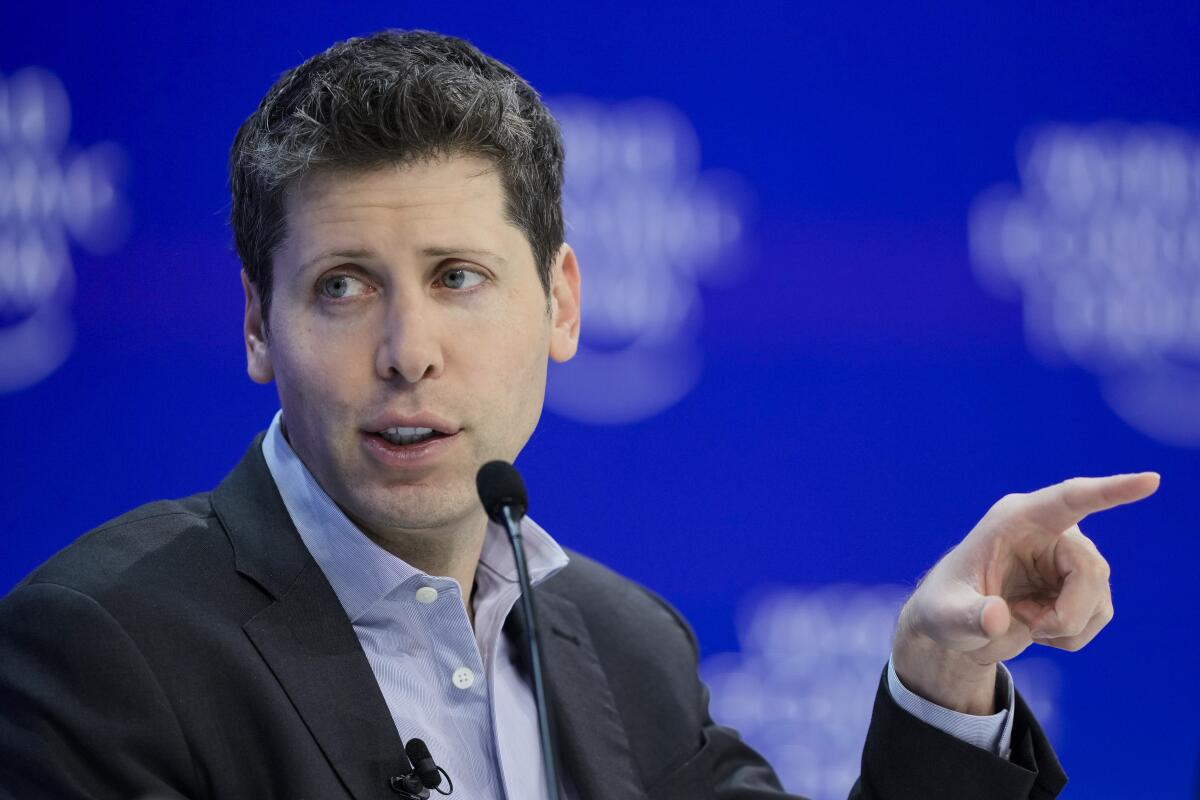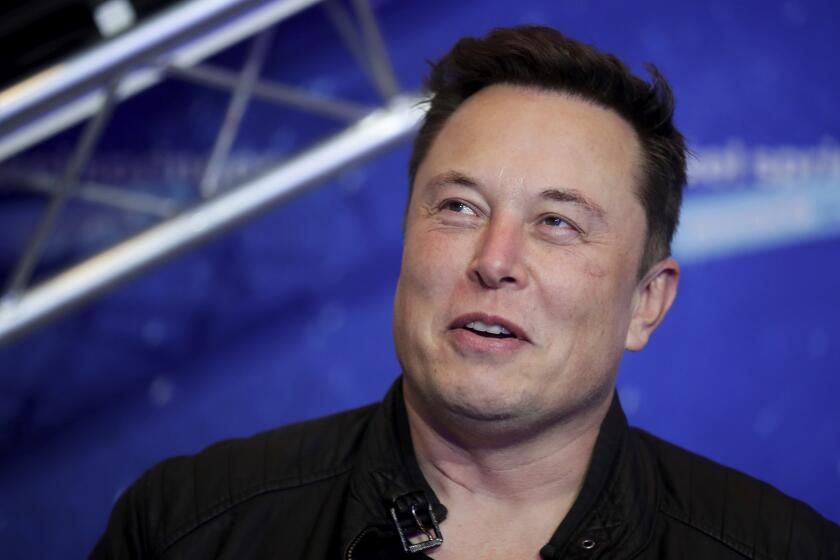Coalition urges California attorney general to halt OpenAI’s for-profit transition

- Share via
SAN FRANCISCO — A coalition of California nonprofits, foundations and labor groups are raising concerns about ChatGPT maker OpenAI, urging the state attorney general to halt the artificial intelligence startup’s plans to restructure itself as a for-profit company.
More than 50 organizations, led by LatinoProsperity and the San Francisco Foundation, signed a petition that was sent to Atty. Gen. Rob Bonta’s office Wednesday, requesting he investigate the Sam Altman-led company.
“OpenAI began its work with the goal of developing AI to benefit humanity as a whole, but its current attempt to alter its corporate structure reveals its new goal: providing AI’s benefits — the potential for untold profits and control over what may become powerful world-altering technologies — to a handful of corporate investors and high-level employees,” the petition said.
Bonta’s office did not have an immediate comment.
In a statement, OpenAI said its board “has been very clear that we intend to strengthen the non-profit so that it can deliver on its mission for the long term.”
“We’re not selling it, we’re doubling down on its work,” the company said. “We look forward to the input and advice from leaders who have experience in community-based organizations on how we can help them achieve their missions, as recently announced by the creation of our advisory Commission.”
San Francisco-based OpenAI began as a nonprofit in 2015 and later launched a for-profit subsidiary to oversee its commercial operations. Currently, the nonprofit’s board oversees that subsidiary, which develops products and services including ChatGPT and text-to-video tool Sora.
Elon Musk’s legal dispute against OpenAI could affect the future of one of the most prominent leaders in artificial intelligence.
But as the competition among AI companies heated up, OpenAI said it needed to change its business structure to raise more money. In December, OpenAI said it would explore transitioning its commercial subsidiary into a public benefit corporation, a type of for-profit business in which the OpenAI nonprofit would have an ownership stake but would no longer control it.
When OpenAI began as a nonprofit research lab, there were no plans for a product — just plans to put out research papers, Altman told newsletter Stratechery in March.
Over time, OpenAI has grown to be a leader in the AI space, with 500 million people using ChatGPT weekly. If he could go back, Altman said, he would have set up the company differently.
“We knew that scaling computers was going to be important, but we still really underestimated how much we needed to scale them,” Altman said in a conversation with Harvard Business School.
Other AI startups including Anthropic and xAI are public benefit corporations.
The proposed change in OpenAI’s structure raised eyebrows among some nonprofit leaders. The petition was doubtful that OpenAI’s charitable assets would be protected, accused OpenAI of not complying with nonprofit rules and raised concerns that other startups would use a nonprofit structure “to create accelerated and amplified possibilities for individual financial benefit.”
OpenAI’s nonprofit board went through a shake-up in 2023. The board voted to fire Altman for alleged lack of consistent candor in his communications with board members. He was reinstated five days later, and the board was restructured, with several opposing board members leaving.
The latest $40-billion investment round will bring the ChatGPT’s valuation to $300 billion.
Last month, OpenAI said it completed a $40-billion funding round led by SoftBank, bringing its valuation to $300 billion. As part of the deal, SoftBank can reduce its investment if OpenAI does not change its corporate structure by the end of the year.
Unlike for-profit businesses, nonprofits are limited in how funds raised are used.
“They can’t sell stock or offer returns,” said Neil Elan, a partner at law firm Stubbs Alderton & Markiles. “Equity is what drives a lot of these high-valuation models. It’s also difficult to fully compete with Meta, Microsoft and Google, which have access to a lot more resources ... without comparable funding.”
OpenAI now ranks as the second-most valuable privately held company, tied with TikTok’s parent company, ByteDance, according to research firm CB Insights. The private firm with the highest valuation is Elon Musk’s SpaceX at $350 billion.
“This is a kind of unprecedented conversion in terms of its size and we just want to make sure that the attorney general really exercises his powers to protect those charitable assets,” said Orson Aguilar, chief executive and founding president of LatinoProsperity, a Los Angeles-based nonprofit that focuses on advancing policies that build wealth in the Latino community.
OpenAI held a screening event on Wednesday, where several filmmakers touted work they made with the startup’s text-to-video tool Sora.
Some nonprofit leaders said what’s happening with OpenAI reminds them of the transition that nonprofit healthcare providers made to for-profits in the 1990s. Government leaders stepped in to help regulate that process.
LatinoProsperity, San Francisco Foundation and other nonprofits first raised concerns to the attorney general in January.
Bonta has sought more information regarding OpenAI’s restructuring, with his deputy attorney general reaching out to the startup and requesting it provide more details. Earlier this year, Bonta’s office told news outlet CalMatters that it’s an ongoing investigation and that the department “is committed to protecting charitable assets for their intended purpose and takes this responsibility seriously.”
Aguilar says “there hasn’t been any meaningful action.”
Some of OpenAI’s competitors have opposed the company’s plans. Last year, Meta wrote to the attorney general. Musk, a co-founder of OpenAI who now runs rival xAI, sued OpenAI, seeking to stop OpenAI from changing its corporate structure.
Nathanael Fast, director of the Neely Center for Ethical Leadership and Decision Making at USC Marshall School of Business, thinks OpenAI will be able to move forward with its plans despite the opposition.
“The big question is, what will happen to the values that they have once all the dust settles and they become a corporation that is competing with other for-profit corporations?” Fast said. “Will they have unique values that they hold on to from their early days as a nonprofit? Or will they look just like any other profit-oriented company?”
More to Read
Inside the business of entertainment
The Wide Shot brings you news, analysis and insights on everything from streaming wars to production — and what it all means for the future.
You may occasionally receive promotional content from the Los Angeles Times.













